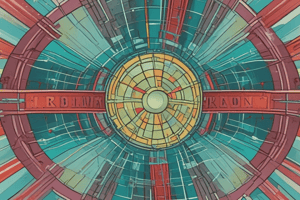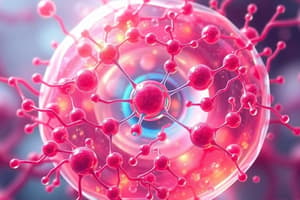Podcast
Questions and Answers
Which of these is NOT a biological characteristic that differentiates males from females?
Which of these is NOT a biological characteristic that differentiates males from females?
- Production of testosterone
- Presence of the X chromosome
- Higher levels of estrogen (correct)
- Presence of the SRY gene on the Y chromosome
Which of the following represents a social or cultural aspect related to men?
Which of the following represents a social or cultural aspect related to men?
- The prevalence of prostate cancer
- The development of the testes
- Societal expectations for men's roles (correct)
- The production of sperm cells
What is one potential consequence of societal expectations and stereotypes about masculinity?
What is one potential consequence of societal expectations and stereotypes about masculinity?
- Underreporting of mental health issues in men (correct)
- Increased sperm count
- Reduced risk of prostate cancer
- Higher levels of testosterone production
Which of these is a health concern that is more prevalent in men compared to women?
Which of these is a health concern that is more prevalent in men compared to women?
What is a potential consequence of genetic variations between individuals?
What is a potential consequence of genetic variations between individuals?
Which of these factors can influence hormonal levels in males?
Which of these factors can influence hormonal levels in males?
How can differences in hormonal regulation affect men?
How can differences in hormonal regulation affect men?
What is a key reason why it's important to be aware of psychological aspects of men's health?
What is a key reason why it's important to be aware of psychological aspects of men's health?
What is the primary function of the male reproductive system?
What is the primary function of the male reproductive system?
Which of the following statements accurately describes the relationship between hormonal signals and sperm production?
Which of the following statements accurately describes the relationship between hormonal signals and sperm production?
What is a defining characteristic of the process of spermatogenesis?
What is a defining characteristic of the process of spermatogenesis?
Which of the following is NOT a key area of ongoing research related to the male reproductive system?
Which of the following is NOT a key area of ongoing research related to the male reproductive system?
Which of the following statements accurately summarizes the current understanding of cognitive differences between men and women?
Which of the following statements accurately summarizes the current understanding of cognitive differences between men and women?
Flashcards
Spermatogenesis
Spermatogenesis
The complex process of sperm production involving different stages and cells.
Male Reproductive System
Male Reproductive System
Designed for sperm production and delivery, influenced by hormones.
Neural and Hormonal Interactions
Neural and Hormonal Interactions
The control mechanism for sexual function in the male reproductive system.
Cognitive Differences
Cognitive Differences
Signup and view all the flashcards
Health Conditions Impact
Health Conditions Impact
Signup and view all the flashcards
XY Chromosomes
XY Chromosomes
Signup and view all the flashcards
SRY Gene
SRY Gene
Signup and view all the flashcards
Testosterone
Testosterone
Signup and view all the flashcards
Social Expectations of Men
Social Expectations of Men
Signup and view all the flashcards
Health Risks for Men
Health Risks for Men
Signup and view all the flashcards
Emotional Expression in Men
Emotional Expression in Men
Signup and view all the flashcards
Genetic Variations
Genetic Variations
Signup and view all the flashcards
Study Notes
Biological Characteristics
- Males possess XY chromosomes, differentiating them from females (XX).
- The Y chromosome carries the SRY gene, crucial for the development of male reproductive organs (testes).
- Testosterone, produced primarily by the testes, is the primary male sex hormone.
- Male reproductive organs include the testes, epididymis, vas deferens, seminal vesicles, prostate gland, and penis.
- Sperm production (spermatogenesis) occurs within the testes.
- Puberty in males typically involves the development of secondary sexual characteristics, such as increased muscle mass, deepening of the voice, and facial hair growth.
- These characteristics are driven by hormonal changes.
Social and Cultural Aspects
- Societal expectations and roles often vary significantly for men across cultures and historical periods.
- These expectations often dictate behavioral norms, emotional expression, and professional pursuits.
- Concepts of masculinity vary across cultures.
- Male stereotypes exist and can influence self-perception.
- Historically, certain social structures have placed men in positions of power and privilege.
Health Considerations
- Men are susceptible to specific health conditions, some more prevalent than in women (e.g., cardiovascular disease, prostate cancer).
- Mental health concerns, like depression and anxiety, are also present in men but often under-reported.
- Different health screenings and preventative measures may be relevant for men.
- Risk factors, dietary habits, and lifestyle choices all play important roles in health disparities between men and women.
- Awareness campaigns and interventions can help address specific health concerns affecting men.
Psychological Aspects
- Emotional expression varies between cultures for men.
- Stereotypes regarding emotional expression in males can lead to under-reporting of mental health problems or hesitation to seek professional help.
- Differences in stress responses or coping mechanisms may exist, although more research is ongoing to delineate specific differences.
- Psychological well-being plays a considerable factor in overall health and wellness.
Biological Variations
- Genetic variations exist between individuals, affecting physical characteristics and health predispositions.
- Hormonal levels vary depending on factors including age, diet, and environmental factors.
- Differences in hormone regulation and response can affect physiological processes.
- These intricate hormonal and genetic factors affect physiology significantly.
Reproductive System Function
- The male reproductive system is designed for sperm production and delivery.
- Sperm production relies on hormonal signals.
- The process of spermatogenesis is complex and involves different stages and cellular components.
- Sexual function is controlled by neural and hormonal interactions.
- Various health conditions can impact the male reproductive system.
Cognitive Differences (If applicable and relevant):
- While significant overlap exists in cognitive abilities between men and women, some minor differences might exist in specific areas, like spatial reasoning or verbal abilities.
- Further research is often needed to verify and fully understand these potential differences.
- Socioeconomic factors often play a greater role than inherent cognitive differences.
Further Research Needed:
- Ongoing research seeks to explore variations and similarities of health conditions between men and women.
- Further investigations related to the development, function, and disease occurrence within the human male reproductive system are underway.
- Studies to identify the factors that influence the prevalence of specific conditions in men are vital.
Studying That Suits You
Use AI to generate personalized quizzes and flashcards to suit your learning preferences.





